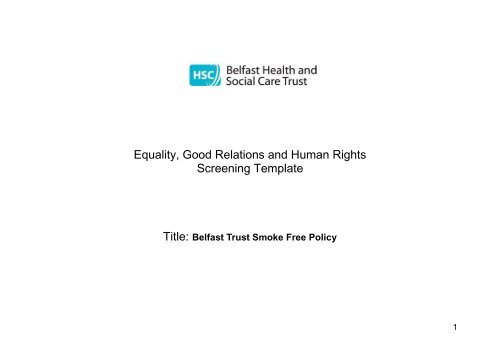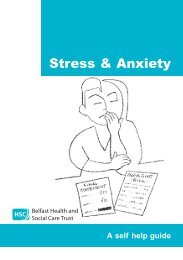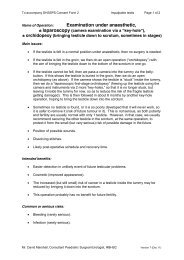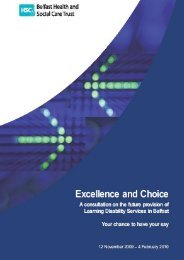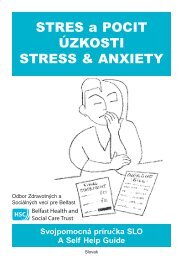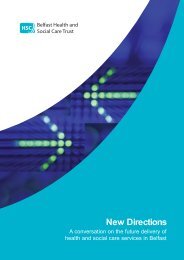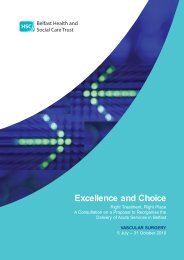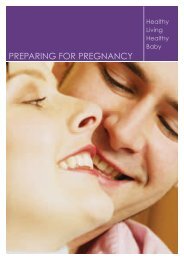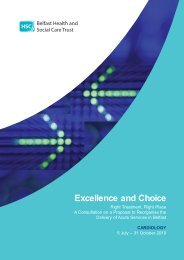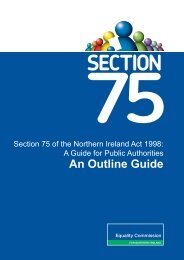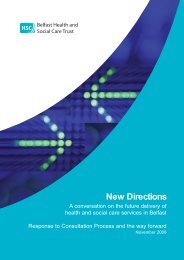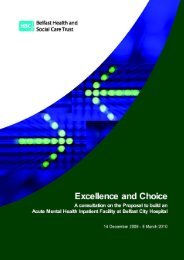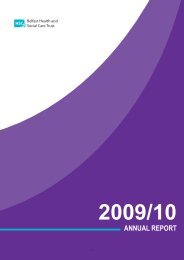Belfast Trust Smoke Free Policy - Belfast Health and Social Care Trust
Belfast Trust Smoke Free Policy - Belfast Health and Social Care Trust
Belfast Trust Smoke Free Policy - Belfast Health and Social Care Trust
Create successful ePaper yourself
Turn your PDF publications into a flip-book with our unique Google optimized e-Paper software.
Equality, Good Relations <strong>and</strong> Human Rights<br />
Screening Template<br />
Title: <strong>Belfast</strong> <strong>Trust</strong> <strong>Smoke</strong> <strong>Free</strong> <strong>Policy</strong><br />
1
***Completed Screening Templates are public documents <strong>and</strong> will be posted on the <strong>Trust</strong>’s website***<br />
See Guidance Notes for further background information on the relevant legislation <strong>and</strong> for help in answering the<br />
questions on this template (follow the links).<br />
(1) Information about the <strong>Policy</strong>/Proposal<br />
(1.1) Name of the policy/proposal<br />
<strong>Belfast</strong> <strong>Trust</strong> <strong>Smoke</strong> <strong>Free</strong> <strong>Policy</strong><br />
(1.2) Is this a new, existing or revised policy/proposal?<br />
Supercedes legacy smoke free policies<br />
(1.3) What is it trying to achieve (intended aims/outcomes)?<br />
The Purpose of the <strong>Belfast</strong> <strong>Health</strong> <strong>and</strong> <strong>Social</strong> <strong>Care</strong> <strong>Trust</strong> is to improve health <strong>and</strong> wellbeing <strong>and</strong> reduce<br />
inequalities. The <strong>Trust</strong> is committed to eliminating smoking on <strong>Trust</strong> Premises to assist staff, patients <strong>and</strong><br />
visitors in order to improve their health <strong>and</strong> wellbeing. The <strong>Belfast</strong> <strong>Trust</strong> is committed to positively influencing<br />
the health <strong>and</strong> wellbeing of our own staff, patients <strong>and</strong> visitors. Preventing people smoking or from passive<br />
smoking is one way we seek to do this. The purpose of this policy is also to ensure compliance with the<br />
provisions of The Smoking (Northern Irel<strong>and</strong>) Order 2006 <strong>and</strong> achieve a smoke-free environment throughout all<br />
enclosed or substantially enclosed spaces within the <strong>Trust</strong>, including buildings, exits <strong>and</strong> entrances <strong>and</strong> <strong>Trust</strong><br />
2
vehicles. In addition the <strong>Trust</strong> as a health care provider want to promote smoke free environments <strong>and</strong> as such<br />
plan to move to smoke free grounds by Dec 2014 for which a separate equality screening will be carried. .<br />
This policy:<br />
- This policy designates all <strong>Trust</strong> workplaces, buildings, exits <strong>and</strong> entrances <strong>and</strong> <strong>Trust</strong> owned vehicles as<br />
smoke-free areas from 1 st June 2013 with some very limited exemption arrangements which are<br />
consistent with current legislation <strong>and</strong> regulation.<br />
- Clarifies the duties <strong>and</strong> responsibilities of staff <strong>and</strong> managers in the implementation <strong>and</strong> operation of the<br />
policy.<br />
The policy applies to all employees of the <strong>Trust</strong>, also to all patients, clients, contractors, visitors, volunteers <strong>and</strong><br />
members of the public using our facilities <strong>and</strong> services.<br />
The <strong>Trust</strong>’s Duty of <strong>Care</strong> also extends to services commissioned by the <strong>Trust</strong> from external organisations on<br />
behalf of patients, clients <strong>and</strong> carers. All such organisations are expected to comply with the provisions of<br />
The Smoking (Northern Irel<strong>and</strong>) Order 2006.<br />
Objectives of policy:<br />
1. To promote the health <strong>and</strong> wellbeing of <strong>Trust</strong> staff by establishing a smoke free work environment.<br />
2. To provide assistance for staff, volunteers, patients <strong>and</strong> clients who wish to stop smoking.<br />
3. To comply with the Smoking (Northern Irel<strong>and</strong>) Order 2006<br />
4. To promote a culture of non-smoking within <strong>Belfast</strong> <strong>Trust</strong>’s catchment population<br />
5. To set good example to the public through positive actions.<br />
6. To reduce the effects of passive smoking.<br />
7. To reduce littering that is associated with smoking.<br />
8. To ensure that all patients, staff <strong>and</strong> visitors are informed of the smoke free policy <strong>and</strong> the expectation<br />
to comply.<br />
3
Exemptions<br />
Some very limited exemptions are listed in the smoke-free legislation. The exemptions relevant to <strong>Belfast</strong> <strong>Trust</strong><br />
are subject to certain conditions: - (see note 4 procedures).<br />
A designated room in Residential <strong>Care</strong> Facilities solely caring for people aged 16 or above.<br />
Private accommodation owned by the <strong>Trust</strong> – e.g. for use as live-in (as opposed to sleep-in)<br />
accommodation by staff or students.<br />
(1.4) How will the proposal be implemented?<br />
The Director of Nursing <strong>and</strong> Medical Director are responsible for monitoring, co-ordinating <strong>and</strong> developing the<br />
policy under the direction of the Chief Executive. Managers will ensure that staff for whom they are responsible<br />
are aware of, <strong>and</strong> adhere, to this policy. The policy will be adopted at all levels of management. All staff<br />
employed by the <strong>Trust</strong> has a responsibility to accept their personal involvement in the application of the <strong>Smoke</strong>free<br />
<strong>Policy</strong>. The <strong>Trust</strong> will ensure that adequate resources are made available to meet the objectives of the<br />
policy.<br />
An Implementation Group under the Chair of the Director of Nursing will be established to order to ensure a<br />
consistent application of the policy throughout the <strong>Trust</strong>. Membership will include representatives from Service<br />
Groups, Estates, <strong>Health</strong> Improvement, Communications, <strong>Health</strong> <strong>and</strong> Safety, Staff Side, Patient Representative &<br />
Human<br />
4
(1.5) Are there any Section 75 categories (see list in 2.1) which might be expected to benefit from the<br />
intended policy/proposal?<br />
The policy may benefit some or all of the 9 Section 75 categories as the policy is aimed at ensuring the health<br />
<strong>and</strong> wellbeing of staff <strong>and</strong> service users.<br />
(1.6) Who owns <strong>and</strong> who implements the policy/proposal?<br />
BHSCT<br />
(1.7) Are there any factors that could contribute to/detract from the intended aim/outcome of the<br />
policy/proposal/decision? (Financial, legislative or other constraints?)<br />
One factor that could contribute to the future success of the policy is that a number of <strong>Trust</strong>s across the UK <strong>and</strong><br />
Irel<strong>and</strong> have successfully implemented <strong>Smoke</strong> <strong>Free</strong> grounds. Within NI the Western <strong>Trust</strong> have stated their<br />
intention to move to <strong>Smoke</strong> <strong>Free</strong> grounds in 2014 <strong>and</strong> others with the support of the Public <strong>Health</strong> Agency<br />
including BHSCT are working towards this.<br />
(1.8) Who are the internal <strong>and</strong> external stakeholders (actual or potential) that the<br />
policy/proposal/decision could impact upon? (staff, service users, other public sector organisations,<br />
trade unions, professional bodies, independent sector, voluntary <strong>and</strong> community groups etc).<br />
5
Staff, patients, clients, visitors, Trade Unions, contractors, volunteers <strong>and</strong> members of the public using our<br />
facilities <strong>and</strong> services.<br />
(1.9) Other policies/strategies/information with a bearing on this policy/proposal (for example internal or<br />
regional policies) - what are they <strong>and</strong> who owns them?<br />
The Smoking (Northern Irel<strong>and</strong>) Order 2006<br />
The employer’s obligations under the <strong>Health</strong> <strong>and</strong> Safety at Work (Northern Irel<strong>and</strong>) Order 1978 – Article 4 states<br />
that employers “have a duty to ensure, so far as is reasonably practicable, the health, safety <strong>and</strong> welfare at work<br />
of all their employees”.<br />
6
(2) Available Evidence / Needs, Experiences <strong>and</strong> Priorities<br />
(2.1) Taking into account the information above what are the different needs, experiences <strong>and</strong> priorities<br />
of each of the Section 75 categories for both service users <strong>and</strong> staff.<br />
Please note there are separate tables for Service Users <strong>and</strong> staff.<br />
Service Users<br />
Category<br />
Details of evidence/information<br />
Service users<br />
<strong>Belfast</strong>/Castlereagh<br />
population as a<br />
whole<br />
Service<br />
users<br />
affected<br />
All service<br />
users<br />
Smoking<br />
prevalence<br />
in <strong>Belfast</strong><br />
remains<br />
around<br />
30%<br />
(compared<br />
to the<br />
Northern<br />
Irel<strong>and</strong><br />
Needs, Experiences & Priorities<br />
The <strong>Belfast</strong> <strong>Trust</strong> is committed to<br />
positively influencing the health <strong>and</strong><br />
wellbeing of our own staff, patients <strong>and</strong><br />
visitors. The policy is aimed at<br />
eliminating smoking on <strong>Trust</strong> Premises<br />
to assist staff, patients <strong>and</strong> visitors in<br />
order to improve their health <strong>and</strong><br />
wellbeing. There is no evidence to<br />
suggest that the policy will have an<br />
adverse impact in terms of all the<br />
Section 75 categories.<br />
The <strong>Trust</strong> will offer a wide range of<br />
help <strong>and</strong> support to those who wish to<br />
give up smoking, including our own<br />
staff. This will be co-ordinated through<br />
7
average of<br />
26%)<br />
the <strong>Health</strong> Improvement Department.<br />
In the <strong>Belfast</strong> <strong>Trust</strong> we have a Smoking<br />
Cessation service which provides<br />
support for patients <strong>and</strong> staff who are<br />
motivated to stop smoking. This<br />
support is arranged at a time <strong>and</strong><br />
venue that suits the individuals needs.<br />
The Smoking Cessation Service is<br />
made up of 5 staff:<br />
3 of these staff are midwives who work<br />
with pregnant woman <strong>and</strong> their<br />
partners in the Hospital <strong>and</strong> community<br />
setting.<br />
2 of these staff work in the 4 acute<br />
Hospitals of the <strong>Belfast</strong> <strong>Trust</strong> to provide<br />
support to patients <strong>and</strong> staff to help<br />
them stop smoking. Staff can access<br />
free Nicotine Replacement Therapy as<br />
part of this service.<br />
8
Gender<br />
Female<br />
Male<br />
51%<br />
49%<br />
*2011 census<br />
. There is no evidence to suggest<br />
different needs in terms of gender.<br />
Age 0-16<br />
16-24<br />
25-34<br />
35-44<br />
45-54<br />
55-64<br />
65+<br />
22%<br />
11%<br />
12%<br />
14%<br />
14%<br />
12%<br />
15%<br />
*2011 census<br />
There is no evidence to suggest<br />
different needs in terms of age.<br />
Religion<br />
Protestant<br />
Roman Catholic<br />
No Religion or<br />
No Religion<br />
Stated<br />
42%<br />
41%<br />
17%<br />
*2011 census<br />
There is no evidence to suggest<br />
different needs in terms of religion.<br />
Political<br />
Opinion<br />
Broadly Unionist<br />
Broadly<br />
Nationalist<br />
Other<br />
Do not wish to<br />
answer/Unknown<br />
48.3%<br />
45.4%<br />
2.3%<br />
4%<br />
* 2011 Assembly<br />
election<br />
There is no evidence to suggest<br />
different needs in terms of political<br />
opinion.<br />
9
Marital Status<br />
Single<br />
Married<br />
Other/Not known<br />
36%<br />
47%<br />
17%<br />
*2011 census<br />
There is no evidence to suggest<br />
different needs in terms of marital<br />
status.<br />
Dependent<br />
Status<br />
Caring for a child<br />
dependant older<br />
person/ person<br />
with a disability<br />
12% of usually<br />
resident population<br />
provide unpaid care<br />
There is no evidence to suggest<br />
different needs in terms of dependent<br />
status.<br />
None<br />
Not known<br />
* 2011 census<br />
Disability<br />
Yes<br />
No<br />
Not known<br />
21%<br />
69%<br />
n/a<br />
*2011 census<br />
All smoking shelters are required to<br />
have suitable physical access. The<br />
policy will be communicated via a<br />
range of mediums. For those with a<br />
disability that requires support in<br />
communication, this will be provided.<br />
Ethnicity<br />
White<br />
non white<br />
Not known<br />
98.21%<br />
1.8%<br />
n/a<br />
*2011 census<br />
Where interpreting or translated<br />
materials are required to communicate<br />
this policy, these will be provided.<br />
10
Sexual<br />
Orientation<br />
Opposite sex<br />
Same sex/Same<br />
<strong>and</strong> Opposite<br />
sex<br />
The general view in<br />
NI is that an<br />
estimated 6-10%<br />
identify as lesbian,<br />
gay, bisexual<br />
There is no evidence to suggest<br />
different needs in terms of sexual<br />
orientation.<br />
Do not wish to<br />
answer/Not<br />
known<br />
*2012 report by<br />
Disability Action &<br />
Rainbow Project<br />
Staff<br />
The <strong>Belfast</strong> <strong>Trust</strong> is committed to positively influencing the health <strong>and</strong> wellbeing of our own staff, patients <strong>and</strong><br />
visitors. The policy is aimed at eliminating smoking on <strong>Trust</strong> Premises to assist staff, patients <strong>and</strong> visitors in<br />
order to improve their health <strong>and</strong> wellbeing. There is no evidence to suggest that the policy will have an adverse<br />
impact on the grounds of Section 75.<br />
The <strong>Trust</strong> will offer a wide range of help <strong>and</strong> support to those who wish to give up smoking, including our own<br />
staff. The <strong>Trust</strong> has a Smoking Cessation service which provides support for patients <strong>and</strong> staff who are<br />
motivated to stop smoking. This support is arranged at a time <strong>and</strong> venue that suits the individual’s needs.<br />
The Smoking Cessation Service is made up of 5 staff:<br />
Staff can access free Nicotine Replacement Therapy as part of this service.<br />
11
Category<br />
Details of evidence/information<br />
Staff<br />
Total <strong>Trust</strong><br />
workforce as at<br />
January 2013<br />
Staff<br />
affected<br />
Needs, Experiences & Priorities<br />
There is no evidence to suggest<br />
different needs.<br />
All section<br />
75<br />
categories<br />
The <strong>Belfast</strong> <strong>Trust</strong> is committed to<br />
positively influencing the health <strong>and</strong><br />
wellbeing of our own staff, patients <strong>and</strong><br />
visitors. The policy is aimed at<br />
eliminating smoking on <strong>Trust</strong> Premises<br />
to assist staff, patients <strong>and</strong> visitors in<br />
order to improve their health <strong>and</strong><br />
wellbeing. There is no evidence to<br />
suggest that the policy will have an<br />
adverse impact on the grounds of<br />
Section 75.<br />
The <strong>Trust</strong> will offer a wide range of<br />
help <strong>and</strong> support to those who wish to<br />
give up smoking, including our own<br />
staff. This will be co-ordinated through<br />
the <strong>Health</strong> Improvement Department.<br />
12
In the <strong>Belfast</strong> <strong>Trust</strong> we have a Smoking<br />
Cessation service which provides<br />
support for patients <strong>and</strong> staff who are<br />
motivated to stop smoking. This<br />
support is arranged at a time <strong>and</strong><br />
venue that suits the individuals needs.<br />
The Smoking Cessation Service is<br />
made up of 5 staff:<br />
3 of these staff are midwives who work<br />
with pregnant woman <strong>and</strong> their<br />
partners in the Hospital <strong>and</strong> community<br />
setting.<br />
2 of these staff work in the 4 acute<br />
Hospitals of the <strong>Belfast</strong> <strong>Trust</strong> to provide<br />
support to patients <strong>and</strong> staff to help<br />
them stop smoking. Staff can access<br />
free Nicotine Replacement Therapy as<br />
part of this service.<br />
Gender<br />
Female<br />
Male<br />
79%<br />
21%<br />
13
Age
Not known 60%<br />
Disability<br />
Yes<br />
No<br />
Not known<br />
2%<br />
66%<br />
32%<br />
All smoking shelters are required to<br />
have suitable physical access. The<br />
policy will be communicated via a<br />
range of mediums, for those with a<br />
disability that requires support in<br />
communication, this will be provided.<br />
Ethnicity<br />
White<br />
Non white<br />
Not known<br />
78%<br />
4%<br />
18%<br />
Where interpreting or translated<br />
materials are required to communicate<br />
this policy, these will be provided.<br />
Sexual<br />
Orientation<br />
(towards<br />
people of the)<br />
Opposite sex<br />
Same sex/Same<br />
<strong>and</strong> Opposite<br />
sex<br />
Do not wish to<br />
answer/Not<br />
known<br />
36%<br />
1%<br />
66%<br />
15
(2.2) Provide details of how you have involved stakeholders, views of colleagues, service users <strong>and</strong> staff etc<br />
when screening this policy/proposal.<br />
This policy has been developed by the <strong>Trust</strong> <strong>Smoke</strong> <strong>Free</strong> Working group which is made up of a wide range<br />
of stakeholders including representatives from <strong>Trust</strong> service groups, patient representation <strong>and</strong> staff side.<br />
The <strong>Trust</strong> have also been working along with the Public <strong>Health</strong> Agency <strong>and</strong> the other <strong>Health</strong> & <strong>Social</strong> Services<br />
<strong>Trust</strong> in the development of the policy.<br />
16
(3) Screening Questions<br />
You now have to assess whether the impact of the policy/proposal is major, minor or none. You will need to<br />
make an informed judgement based on the information you have gathered.<br />
Staff<br />
(3.1)What is the likely impact of equality of opportunity for those affected by this policy/proposal, for<br />
each of the Section 75 equality categories?<br />
Section 75<br />
Category<br />
Details of policy/proposal<br />
impact<br />
Level of impact?<br />
Minor/major/none<br />
Gender None for all 9<br />
categories<br />
(3.2) Are there<br />
opportunities to better<br />
promote equality of<br />
opportunity for people<br />
within Section 75 equality<br />
categories?<br />
If yes, provide details.<br />
If no, provide reasons.<br />
The policy is aimed at all<br />
staff, service users, visitors<br />
<strong>and</strong> the public to improve<br />
health <strong>and</strong> wellbeing <strong>and</strong><br />
reduce inequalities,<br />
including those in Section<br />
75 groups. A<br />
communications campaign<br />
will be carried out to ensure<br />
that all staff are aware of<br />
the policy.<br />
17
Age<br />
Religion<br />
Political Opinion<br />
Marital Status<br />
Dependent Status<br />
Disability<br />
Ethnicity<br />
Sexual Orientation<br />
All smoking shelters are<br />
required to have suitable<br />
physical access. The policy<br />
will be communicated via a<br />
range of mediums, for<br />
those with a disability that<br />
requires support in<br />
communication, this will be<br />
provided.<br />
Where interpreting or<br />
translated materials are<br />
required to communicate<br />
this policy, these will be<br />
provided.<br />
Service Users<br />
(3.1) What is the likely impact of equality of opportunity for those affected by this policy/proposal, for<br />
each of the Section 75 equality categories?<br />
Category<br />
Details of policy/proposal<br />
impact<br />
Level of impact?<br />
Minor/major/none<br />
(3.2) Are there<br />
opportunities to better<br />
promote equality of<br />
opportunity for people<br />
18
within Section 75 equality<br />
categories?<br />
Gender None for all 9<br />
categories<br />
Age<br />
Religion<br />
Political Opinion<br />
Marital Status<br />
Dependent Status<br />
Disability<br />
Ethnicity<br />
Sexual Orientation<br />
If yes, provide details.<br />
If no, provide reasons.<br />
The policy is aimed at all<br />
staff, service users, visitors<br />
<strong>and</strong> the public to improve<br />
health <strong>and</strong> wellbeing <strong>and</strong><br />
reduce inequalities,<br />
including those in Section<br />
75 groups. A<br />
communications campaign<br />
will be carried out to ensure<br />
that service users, the<br />
public <strong>and</strong> visitors are<br />
aware of the policy.<br />
19
(3.3)<br />
To what extent is the policy/proposal likely to impact on good relations between people of different<br />
religious belief, political opinion or racial group? Minor/major/none<br />
Good relations Details of policy/proposal impact Level of impact<br />
category<br />
Religious belief<br />
Political opinion<br />
Racial group<br />
The policy is aimed at improving the health<br />
<strong>and</strong> wellbeing of staff, service users,<br />
clients, volunteers <strong>and</strong> members of the<br />
public <strong>and</strong> will not have an impact in terms<br />
of good relations<br />
Minor/major/none<br />
None<br />
None<br />
None<br />
(3.4)<br />
Are there opportunities to better promote good relations between people of different religious belief,<br />
political opinion or racial group?<br />
Good relations category<br />
Religious belief<br />
Please provide details<br />
The <strong>Belfast</strong> <strong>Trust</strong> is committed to ensuring that each of its facilities<br />
are neutral, safe <strong>and</strong> welcoming to all service users. In order to<br />
achieve this, the <strong>Trust</strong> has developed a good relations strategy<br />
which includes a number of actions <strong>and</strong> projects which include a<br />
Good Relations statement that will be visible in all <strong>Trust</strong> facilities.<br />
The statement expresses BHSCT’s commitment to providing an<br />
environment where <strong>Health</strong> <strong>and</strong> <strong>Social</strong> <strong>Care</strong> is provided in a safe<br />
<strong>and</strong> welcoming environment. The <strong>Trust</strong> also has a harmonious<br />
working environment policy for staff <strong>and</strong> a policy that all staff must<br />
receive m<strong>and</strong>atory equality, diversity good relation <strong>and</strong> human<br />
rights training. The <strong>Trust</strong> is committed to working in partnership<br />
with staff, service users, the community, statutory organisations<br />
20
<strong>and</strong> voluntary <strong>and</strong> community organisations to ensure that service<br />
users receive the highest quality of health <strong>and</strong> social care in the<br />
right place at the right time in a neutral, safe <strong>and</strong> welcoming<br />
environment.<br />
The religious, cultural <strong>and</strong> spiritual needs of all staff <strong>and</strong> service<br />
users will be accommodated.<br />
Political opinion<br />
Racial group<br />
As above<br />
As above<br />
(4) Is there an opportunity to better address the health <strong>and</strong> social inequalities of<br />
groups/areas in greatest social, economic or educational need by altering the<br />
policy/decision?<br />
Suggestions<br />
Smoking prevalence in <strong>Belfast</strong> remains around 30% (compared to the Northern Irel<strong>and</strong> average of 26%) <strong>and</strong> the<br />
gap in smoking rates between people in manual <strong>and</strong> non-manual groups has increased.<br />
There is a strong link between cigarette smoking <strong>and</strong> socio-economic group. Smoking has been identified as the<br />
single biggest cause of inequality in death rates between rich <strong>and</strong> poor in the UK.<br />
Smoking accounts for over half of the difference in risk of premature death between social classes.<br />
Long-term smokers bear the heaviest burden of death <strong>and</strong> disease related to their smoking. Long term smokers<br />
are disproportionately drawn from lower socio-economic groups. People in poorer social groups who smoke,<br />
start smoking at an earlier age: of those in managerial <strong>and</strong> professional households about one third start<br />
smoking before age 16 compared with almost half of those in routine <strong>and</strong> manual households<br />
21
This policy is aimed at improving the health <strong>and</strong> wellbeing <strong>and</strong> reducing inequalities of Staff, patients, clients,<br />
visitors, volunteers <strong>and</strong> members of the public using our facilities <strong>and</strong> services.<br />
22
(5) Consideration of Disability Duties<br />
How does the policy/proposal or decision currently encourage disabled people to participate in public<br />
life <strong>and</strong> promote positive attitudes towards disabled people? Consider what other measures you could<br />
take.<br />
The <strong>Belfast</strong> <strong>Trust</strong> is committed to encouraging disabled people to participate in public life <strong>and</strong> promote positive<br />
attitudes towards disabled people? The policy is aimed at improving the health <strong>and</strong> wellbeing of all staff, service<br />
users, visitors, volunteers <strong>and</strong> the public. Measures will be taken to ensure that where support <strong>and</strong> alternative<br />
forms of communication are required with regard to this policy this will be implemented.<br />
All smoking shelters are required to have suitable physical access.<br />
Disability awareness training is available to all staff.<br />
For example, have your staff received disability equality training or training on the <strong>Trust</strong>’s Patient <strong>and</strong> Client<br />
Experience St<strong>and</strong>ards?<br />
23
(6) Consideration of Human Rights<br />
(6.1) Does the policy/proposal affect anyone’s human rights in a positive, negative or neutral way?<br />
Complete for each of the articles<br />
Article<br />
Article 2 – Right to life<br />
Positive<br />
impact<br />
<br />
Negative<br />
impact =<br />
human right<br />
interfered<br />
with or<br />
restricted<br />
Neutral<br />
impact<br />
Article 3 – Right to freedom from torture, inhuman or<br />
degrading treatment or punishment<br />
Article 4 – Right to freedom from slavery, servitude & forced or<br />
compulsory labour<br />
Article 5 – Right to liberty & security of person<br />
<br />
<br />
<br />
Article 6 – Right to a fair & public trial within a reasonable time<br />
Article 7 – Right to freedom from retrospective criminal law &<br />
no punishment without law<br />
Article 8 – Right to respect for private & family life, home <strong>and</strong><br />
correspondence.<br />
Article 9 – Right to freedom of thought, conscience & religion<br />
Article 10 – Right to freedom of expression<br />
<br />
<br />
<br />
<br />
<br />
24
Article 11 – Right to freedom of assembly & association<br />
Article 12 – Right to marry & found a family<br />
<br />
<br />
Article 14 – Prohibition of discrimination in the enjoyment of<br />
<br />
the convention rights<br />
1 st protocol Article 1 – Right to a peaceful enjoyment of<br />
<br />
possessions & protection of property<br />
1 st protocol Article 2 – Right of access to education <br />
Please note: If you have identified potential negative impact in relation to any of the Articles in the table above,<br />
speak to your line manager <strong>and</strong>/or a representative from the Equality Team. It may also be necessary to seek<br />
legal advice.<br />
(6.2) Please outline any actions you will take to promote awareness of human rights <strong>and</strong> evidence that<br />
human rights have been taken into consideration in decision making processes.<br />
The <strong>Belfast</strong> HSC <strong>Trust</strong> is committed to the promotion of Human Rights for all staff <strong>and</strong> service users. All staff<br />
must attend m<strong>and</strong>atory equality, diversity, good relations <strong>and</strong> human rights training.<br />
25
(7) Screening Decision<br />
(7.1) Given the answers in Section 4, how would you categorise the impacts of this<br />
policy/proposal?<br />
Major impact<br />
Minor impact<br />
No impact<br />
<br />
(7.2) Do you consider the policy/proposal needs to be subjected to ongoing screening?<br />
Yes<br />
No<br />
<br />
A full Equality Impact Assessment (EQIA) is usually confined to those policies or decisions considered to have<br />
major implications for equality of opportunity.<br />
(7.3) Do you think the policy/proposal should be subject to an Equality Impact Assessment (EQIA)?<br />
Yes<br />
No<br />
<br />
26
(7.4) Please give reasons for your decision.<br />
The <strong>Belfast</strong> <strong>Trust</strong> is committed to positively influencing the health <strong>and</strong> wellbeing of our own staff, patients,<br />
visitors, <strong>and</strong> the public <strong>and</strong> reducing health inequalities. This policy is aimed at preventing people smoking or<br />
from passive smoking <strong>and</strong> improving health <strong>and</strong> wellbeing <strong>and</strong> will not have an adverse impact in terms of<br />
Section 75 .<br />
(7.5) If you have identified any impact, what mitigation have you considered to address this?<br />
27
(8) Monitoring.<br />
In line with the guidance, you will be obliged to monitor this policy every 2 years.<br />
Please detail how you will monitor the effect of the policy/proposal for equality of opportunity <strong>and</strong> good<br />
relations, disability duties <strong>and</strong> human rights?<br />
The implementation of the policy will be monitored by a number of methods:<br />
Managers will record incidences of breaches of the policy using the <strong>Trust</strong>’s Incident Form.<br />
Human resources will collate information on the number <strong>and</strong> range of adverse incidents <strong>and</strong> provide<br />
regular reports to the Implementation group.<br />
<strong>Health</strong> Improvement/Occupational <strong>Health</strong> providing information on the numbers of people seeking help in<br />
giving up smoking.<br />
The Director Of Nursing / Medical Director will provide an Implementation Report to the <strong>Trust</strong> Board<br />
annually.<br />
28
Approved Lead Officer:<br />
Position:<br />
Date:<br />
Bryan Nelson<br />
Senior Manager <strong>Health</strong> Improvement<br />
15 April 2013<br />
<strong>Policy</strong>/proposal screened by<br />
Equality Manager:<br />
Employment Equality<br />
Manager:<br />
Veronica McEneaney<br />
Miriam Gibson<br />
Please forward completed schedule to lesley.jamieson@belfasttrust.hscni.net<br />
29


